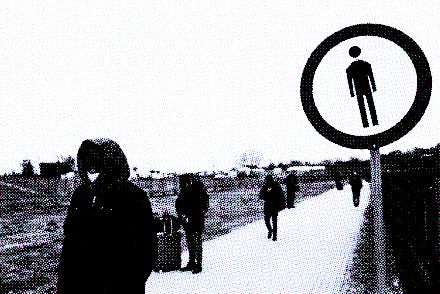Racism is making the Russia-Ukraine conflict even worse
Africans in Ukraine say they’ve been turned away when seeking help, while the media keeps making disgusting comparisons between European refugees and Middle Eastern ones.

Ukrainian residents have faced many, many tragedies as the Russian military has pushed across the country’s border in an illegitimate attempt to retake control of the land. But the experience has been particularly harrowing for Africans in Ukraine, who have faced racist treatment and been trapped in Ukraine despite attempts to flee.
While Russia’s war on Ukraine has often been portrayed as “brother vs. brother” — an attack on people with a similar culture who speak the same language — there is a notable population of Afro-Ukrainians who have been caught in the middle of the ugliness. According to the Irish Times, about 20% of Ukraine’s international student population is from Africa, and there are additional African migrants who settled Ukraine or are visiting for work. While comprehensive demographic data isn’t available, Axios says there are a “few thousand” Black Ukrainians who have settled in some of Ukraine’s largest cities.
These populations have faced racism within Ukraine’s borders for years, and some of that ugliness has come out as Africans and Black Ukrainians have attempted to flee the cities that Russia is shelling with deadly artillery. A BBC reporter relayed the account of a Nigerian medical student who was held for more than seven hours at the Poland border because guards were insisting on letting “Ukrainians” through first, suggesting that Black people are somehow “other” and less in need of safety. Videos have also started making the rounds showing Black people getting held back from trains and forced to wait while others board.
Meanwhile, a Nigerian national who has lived in Ukraine for more than a decade told The Independent that he had his family members were asked to get off a bus that was on its way out of Ukraine. They were told “no Blacks” were allowed on board. “In all of my years as an activist, I have never seen anything like this. When I look into the eyes of those who are turning us away, I see bloodshot racism,” he told the publication. “They want to save themselves and they are losing their humanity in the process.”
Zhan Beleniuk, a Black Ukrainian lawmaker, has previously called attention to the mistreatment that he and others have experienced in the country — including being on the receiving end of ugly slurs right after he won a gold medal for Ukraine at the 2020 Olympics. Axios noted that Beleniuk posted a photo of himself cleaning a pistol last week, suggesting he was ready to take up arms for Ukraine.
Making the situation worse is the fact that, according to Quartz, there has not been a coordinated effort to help Afro-Ukrainians safely flee the country. There has been little to no reported effort by African countries to coordinate an evacuation of their citizens, despite the fact that much of the continent has condemned Russia’s actions.
It’s impossible to ignore the racism at play here — particularly given the context of past conflicts. European countries have opened their doors to Ukrainian refugees and taken in more than 400,000 people who have spent days attempting to escape the violence that Russia has brought. But those same countries were far more hesitant to take in Syrian refugees when the country was in the midst of a brutal civil war.
Bulgarian Prime Minister Kiril Petkov put words to this in the most upsetting and disturbing way imaginable. “These are not the refugees we are used to … these people are Europeans,” he said of the Ukrainians fleeing to nearby neighboring countries. “This is not the refugee wave we have been used to, people we were not sure about their identity, people with unclear pasts, who could have been even terrorists ... There is not a single European country now which is afraid of the current wave of refugees.”
Mainstream media has made similarly ugly statements. A CBS News reporter contrasted Ukraine with Iraq by saying the country is “relatively civilized, relatively European” and a “city where you wouldn’t expect that or hope that [war] was going to happen.” Another reporter on the U.K.’s ITV News said, “This is not a developing third world nation, this is Europe.” On Al Jazeera, an anchor mused, “What’s compelling is just looking at them, the way they’re dressed, these are prosperous middle-class people. These are not obviously refugees trying to get away from areas in the Middle East ... they look like any European family you would live next door to.”
The language of these reports, as well as the treatment of refugees in the past and right now, make it clear that racism is still deeply embedded in these regions, no matter how open and accepting European nations may present themselves to be. They view white Ukrainians as fellow Europeans, but they only see Black Ukrainians and Black refugees as being Black. Getting people to safety is the most pressing matter as the war continues, and racism is making achieving safety that much harder for Black people.